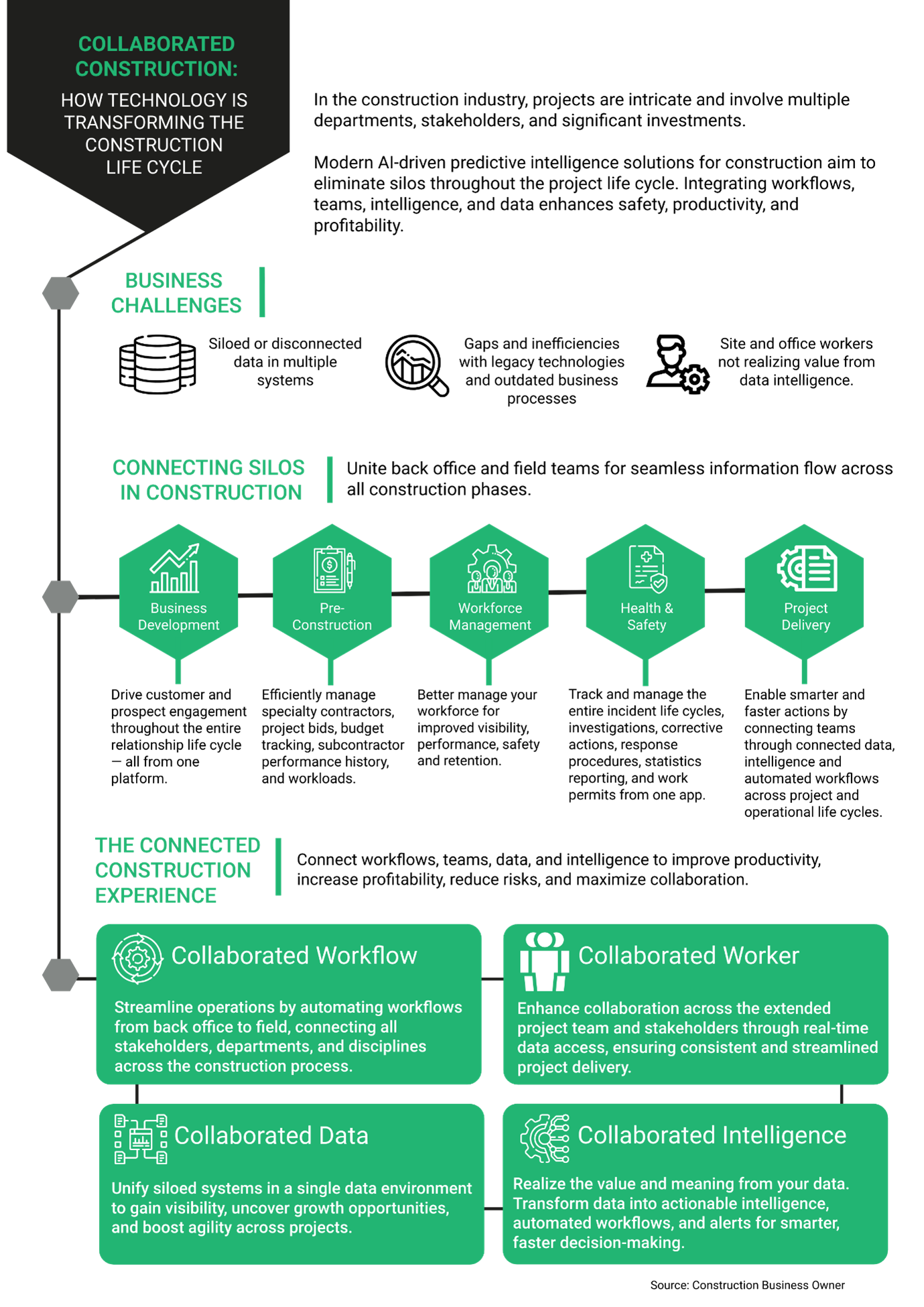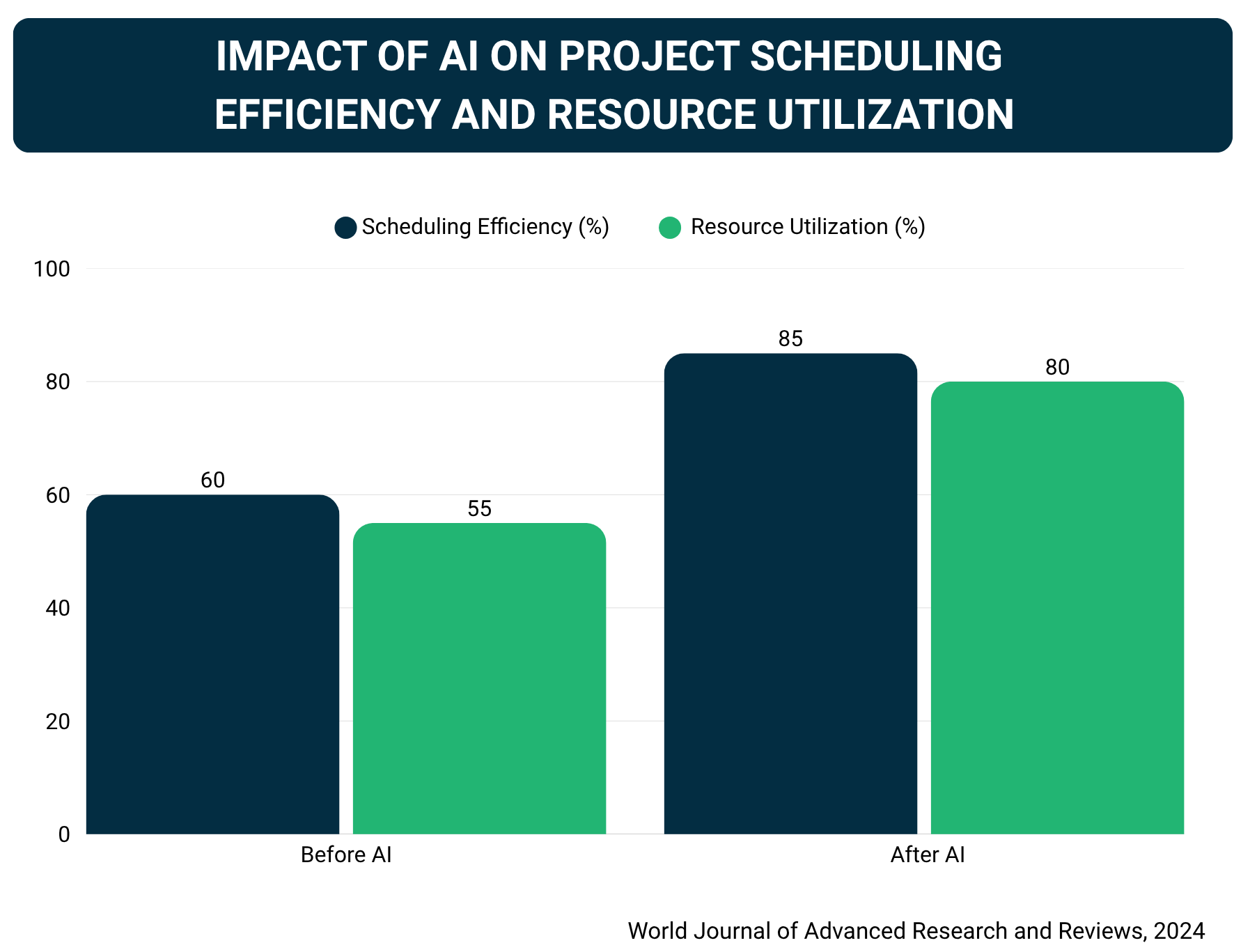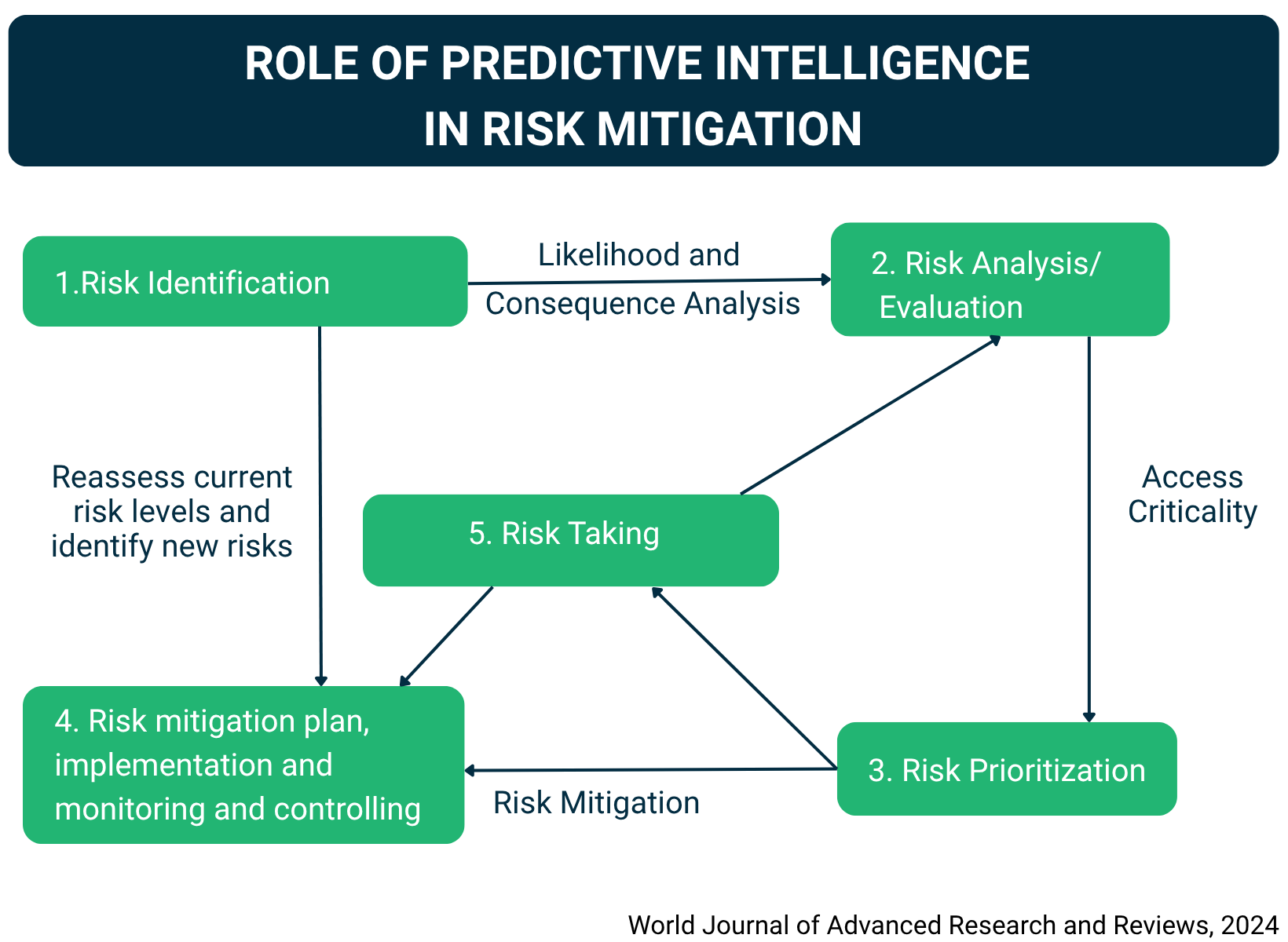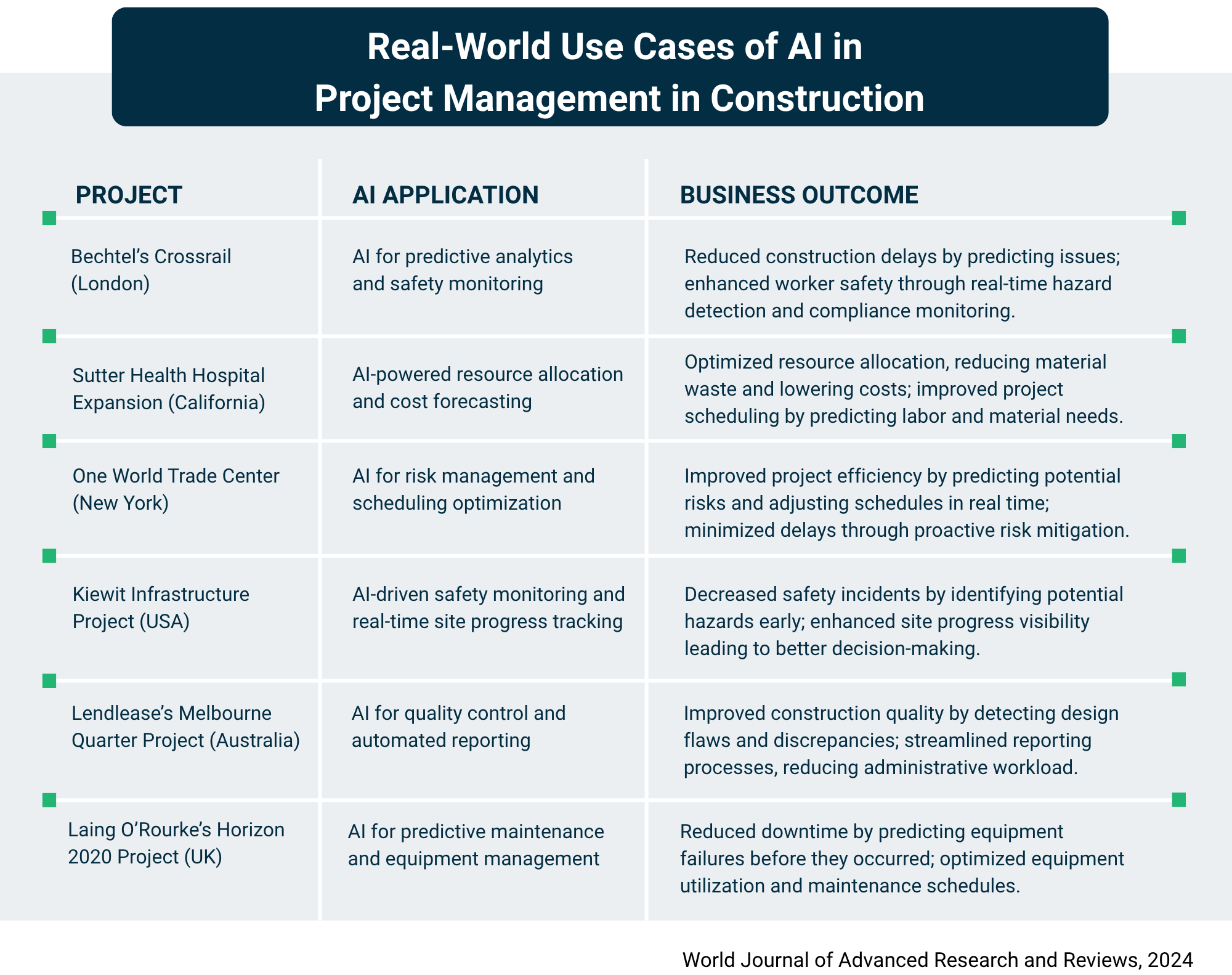
Quick Summary: Project management in construction is evolving from reactive scheduling to predictive, foresight-driven execution. Fragmented supply chains, underused data, and rising compliance demands leave firms vulnerable to delays and overruns. Predictive intelligence transforms construction project management by providing early warnings, dynamic resource forecasts, and prescriptive recommendations—enabling teams to move from firefighting to anticipatory control. Embracing predictive solutions helps firms boost resilience, protect margins, and deliver projects with precision, agility, and strategic clarity.
A global construction market valued at $10.5 trillion in 2023 is under increasing pressure to deliver faster, leaner, and greener. What separates future-ready firms from faltering ones isn't just how well they build, but how precisely they plan, predict, and govern their projects.
In a sector where billion-dollar decisions hinge on daily execution, project management in construction has become the strategic nerve center of the built environment. Yet, despite its criticality, many firms are still wrestling with legacy processes and fragmented oversight.
Success now requires more than on-time and on-budget delivery; it demands a dynamic, foresight-driven management model that blends predictive intelligence with operational agility and resilience.
This article explores the evolving role of project management in construction—from structural inefficiencies and data-centric transformation to predictive governance, modern best practices, and the strategic blueprint for future-ready execution.
Why Project Management in Construction Requires a Distinct Discipline
The construction industry contributes 13% to global GDP yet remains one of the least digitized sectors. According to Deloitte, this digital lag costs the industry up to $1.6 trillion annually in lost productivity and rework. Unlike IT or manufacturing, project management in construction must account for dynamic variables across job sites, labor forces, material logistics, and unpredictable externalities.
Here’s why the discipline must be treated uniquely:
- Fragmented Supply Chains – Stakeholder ecosystems are complex and loosely coupled, from contractors to subcontractors and suppliers.
- Non-Standardized Environments – Every site differs in geography, local regulation, and workforce skill levels, making standardization difficult.
- Multi-Layer Risk Exposure – Regulatory, safety, environmental, and financial risks converge in real time.
- Limited Historical Benchmarking – No two projects are alike, meaning past data is less reusable without intelligent contextualization.
An alarming statistic from Plan Academy shows that 70% of construction projects globally experience delays, while over 60% exceed their budgets. The root cause? Poor visibility, reactive decision-making, and underutilized data.
Treating project management merely as a scheduling function ignores its evolving role: as the architect of predictability, precision, and high-performing outcomes.
The Current Landscape of Project Management in Construction: What’s Changing?
Mounting Pressures on Margins and Maturity. Construction firms today face a triple bind:
- Operational Volatility from supply chain disruptions, inflation, and labor shortages
- Regulatory Expansion, including ESG compliance, local mandates, and carbon reporting
- Rising Client Expectations for speed, transparency, and sustainability
Deloitte’s 2023 Digital Adoption in Construction report found that while 88% of executives believe digital transformation is crucial, only 15% rate their maturity as high. The delta between ambition and ability is now a source of competitive risk.
What’s Driving the Shift in Project Management in Construction
- Data Overload Without Insight
IoT sensors, drones, and BIM tools generate terabytes of data, but most firms use less than 20% of it for strategic decision-making (source: McKinsey Global Institute). - Unscalable Oversight Models
Static reports, spreadsheet trackers, and siloed systems can’t keep pace with project complexity and real-time site conditions. - Transition from Predictive to Prescriptive
While predictive analytics flags risks early, the emerging frontier is prescriptive intelligence—AI that recommends optimal actions, not just forecasts issues. - Stakeholder Scrutiny is Higher
From investors to regulatory bodies, construction firms are now judged not only on results, but on resilience, transparency, and social impact.
This evolving landscape demands a project management model that’s no longer reactive or rigid, but agile, anticipatory, and deeply integrated with business strategy.

Top Challenges in Project Management in Construction Today
Despite major advances in tools and digital frameworks, persistent barriers continue to constrain performance in project management in construction. These aren’t new issues—they’re longstanding problems now amplified by the scale, velocity, and expectations of modern projects.
- Fragmented Execution Ecosystems
Construction projects typically operate through a dispersed network of subcontractors, suppliers, architects, and agencies. Without synchronized systems or predictive alignment, these stakeholders often work in silos, increasing the risk of miscommunication, rework, and cascading delays. - Delayed Risk Recognition
A 2024 WJARR report reveals that over 50% of project delays stem from scope creep and late-stage design changes. Traditional risk registers lack the agility to anticipate evolving project variables. Predictive intelligence, however, introduces earlier detection windows—flagging deviations and disruptions while there’s still time to intervene. - Underutilization of Data
From drones to digital twins, data is captured across every phase of construction—but less than 25% of it is leveraged for decision-making. The absence of integration across platforms often means critical insights go unnoticed, making proactive action nearly impossible. - Workforce Volatility
With over 40% of the skilled workforce approaching retirement (Deloitte, 2024), talent gaps are becoming structural risks. Predictive tools help alleviate this by modeling workforce productivity patterns and optimizing crew allocation in response to project complexity and real-time conditions. - Compliance and Regulatory Complexity
Modern project oversight now extends to environmental, labor, and governance metrics. As ESG mandates expand, project managers must navigate a wider web of compliance variables. Predictive monitoring systems reduce this burden by helping teams stay ahead of evolving regulations.
Construction firms can no longer rely on reactive models. Future success lies in embedding systems that interpret signals early, enabling decisions that protect margins, timelines, and reputations.
Data and Predictive Intelligence: A Strategic Game Changer in Project Management in Construction
Capturing data is no longer the challenge—extracting value from it is. The next evolution of project management in construction is being defined by how firms harness predictive intelligence to convert complexity into clarity.
The Rise of Predictive Project Management
In a sector where margins are thin and variables are volatile, predictive intelligence is shaping a new standard of project execution—one that is foresight-driven and continuously adaptive.

Key contributions include:
- Early Warning Systems
Algorithms assess historical trends, weather, labor behavior, and cost shifts—delivering alerts well before issues become critical. - Dynamic Resource Forecasting
Models continuously project resource needs based on evolving jobsite data, enabling better planning and reducing last-minute scrambles. - Behavioral and Vendor Insights
PI systems evaluate patterns in vendor performance, quality, and safety—supporting proactive decisions about who to hire, reassign, or replace. - Scenario Simulation
Whether modeling a 10% rise in material costs or a loss of rain days, predictive platforms allow teams to simulate and respond with precision.
Deloitte’s 2023 report on data capabilities in construction found that firms using predictive analytics achieved 30–35% faster delivery and up to 25% fewer rework instances. These aren’t marginal gains—they represent decisive advantages in a risk-heavy environment.

Predictive intelligence doesn't displace human experience. It enhances it—empowering teams to shift from reacting to anticipating, and from managing chaos to steering with control.
Ready to shift from guesswork to foresight? See how leading construction firms are using TrueProject to reduce rework and reclaim control—Request a live demo.
Modern Best Practices That Drive On-Time, On-Budget Construction Projects
Technology alone does not guarantee transformation. High-performing firms apply best practices that operationalize project management in construction through precision, foresight, and execution discipline.
- Integrated Planning from Day Zero
Effective construction management starts with aligning cost, schedule, procurement, labor, and design early. Unified platforms that use predictive models can spot early misalignments that jeopardize execution later. - Live Monitoring with Actionable KPIs
The shift is from historical reporting to live dashboards, powered by predictive logic. These systems surface leading indicators of trouble—cost drift, productivity dips, or scheduling gaps—and trigger automated alerts to course-correct in real time. - Change Management through Predictive Recalibration
Scope changes are inevitable. What matters is how swiftly teams recalibrate. Predictive systems recalculate downstream impacts across labor, cost, and timelines instantly, enabling faster, data-driven pivots. - Feedback-Driven Learning Systems
Firms that embed learnings from every completed project into future models shorten learning curves and improve project estimation accuracy over time. - Evolving Risk Registers
Static spreadsheets are being replaced by dynamic dashboards that continuously reprioritize risk based on live data, external inputs, and predictive triggers.
Plan Academy reports that firms embedding these predictive practices have reduced project delays by up to 45%. This reflects not just operational improvement—but strategic leadership in an industry increasingly defined by agility and insight.
Don’t just monitor progress—govern it with predictive clarity. Schedule a walkthrough of TrueProject’s intelligent dashboard built for construction leaders.
How Predictive Tools Transform Project Governance in Construction
Traditional governance frameworks—anchored in milestone reviews and post-mortem audits—often detect issues only after they’ve impacted delivery. In modern construction, such latency costs time, money, and reputation. Predictive intelligence redefines project governance from passive oversight to strategic foresight.
From Monitoring to Orchestration

Instead of lagging indicators, project governance now relies on forward-looking analytics that continuously assess risks, performance, and compliance. Predictive tools elevate governance by enabling:
- Real-Time Deviation Detection
Machine learning models scan cost reports, safety updates, and productivity logs daily—instantly flagging when a project veers off baseline performance thresholds. - Automated Alerts Based on KPI Thresholds
Smart systems track Schedule Performance Index (SPI), Cost Performance Index (CPI), and other critical metrics, generating alerts when pre-set thresholds are crossed—activating executive intervention early. - Confidence-Level Forecasting
Predictive dashboards offer confidence scores on task completion, schedule adherence, and budget integrity—enabling informed prioritization of management focus.
Governance Beyond Compliance
Today’s governance mandates extend well beyond financials. Predictive governance also enables:
- Live Audit Trails
Every change, decision, and approval is logged—enhancing traceability, reducing disputes, and building client trust. - Predictive Compliance Tracking
Regulatory changes—especially in ESG—are tracked and mapped against project parameters, ensuring proactive adherence without manual oversight.
With predictive governance, construction leaders can replace firefighting with foresight—transforming governance into a continuous, high-value asset that aligns projects with strategic goals.
Need a faster way to operationalize predictive governance? Start with the TrueProject QuickStart Plan—tailored for rapid impact, minimal disruption.
From Risk to Resilience: Reimagining Project Success in Construction
Project success is no longer measured only by timelines and budgets. In an era of extreme complexity, success is defined by resilience—the ability to adapt swiftly, absorb shocks, and deliver value despite volatility. This shift is reshaping how project management in construction is executed and evaluated.

What Resilient Construction Projects Look Like
- Real-Time Agility
Teams adjust schedules, reallocate resources, and pivot execution strategies in response to changing conditions—without derailing broader milestones. - Predictive Buffering
Algorithms recommend buffer allocations—whether it’s extra crew capacity or material reserves—based on projected risks, ensuring smoother execution. - Continuous Learning Loops
Lessons from past projects are fed into future planning systems, closing the gap between forecasting and field reality.
The Strategic Payoff
According to Deloitte’s 2024 Construction Outlook:
- Resilient firms saw up to 25% higher project ROI.
- They reported stronger client retention and referral rates.
- Win rates in competitive bids rose due to improved confidence in delivery predictability.
Resilience isn’t reactive—it’s engineered. Through predictive project management, construction firms evolve from surviving disruptions to thriving within them.
Curious how predictive resilience can future-proof your portfolio? Let’s discuss what that could look like for your teams and timelines.
Conclusion: A Future-Ready Blueprint for Project Management in Construction
The construction industry is being reshaped not by the tools it adopts, but by the foresight it exercises. Project management in construction must now operate as a strategic lever—one that integrates planning, execution, governance, and adaptation through intelligent systems and data-driven clarity.
Predictive intelligence elevates this discipline from operational management to anticipatory leadership. It enables teams to move from tracking delays to preventing them, from reporting problems to prescribing solutions. This is not a trend—it’s the trajectory of high-performing firms ready to thrive under scrutiny, scale, and complexity.
Why TrueProject Is the Logical Next Step
TrueProject is built for this very inflection point. As a predictive project management solution driven by KPIs, it brings unmatched clarity and control to complex construction environments.
Its capabilities include:
- Real-time project health scoring, with automated thresholds and KPI triggers.
- Integrated data collection across schedules, costs, tools, and stakeholder sentiment—delivering complete situational awareness.
- Prescriptive guidance, not just early warnings—backed by proven benchmarks and analytics.
Where traditional tools track status, TrueProject forecasts outcomes. Where others alert, it advises. It helps project managers ensure not just compliance, but strategic alignment and proactive execution.
Construction leaders looking to convert unpredictability into confidence will find in TrueProject more than software—it’s a command center for elevated project performance.
Projects that outperform tomorrow are led with intelligence today. Explore how TrueProject helps your teams move from reaction to readiness.
FAQs
1. What is project management in construction and why is it important?
Project management in construction involves coordinating resources, timelines, and compliance across unique, high-risk projects. It ensures efficiency, quality, and accountability from planning to delivery.
2. What are the biggest challenges in construction project management today?
Major challenges include fragmented teams, delayed risk detection, underused data, labor shortages, and growing ESG compliance demands—affecting timelines and costs.
3. How does predictive intelligence benefit project management in construction?
Predictive intelligence anticipates delays, optimizes resource allocation, simulates risk scenarios, and enables smarter, faster decisions throughout the project lifecycle.
4. What is the best predictive solution for project management in construction?
A platform like TrueProject, which combines real-time KPIs, risk foresight, stakeholder sentiment, and prescriptive analytics, significantly improves project outcomes.






